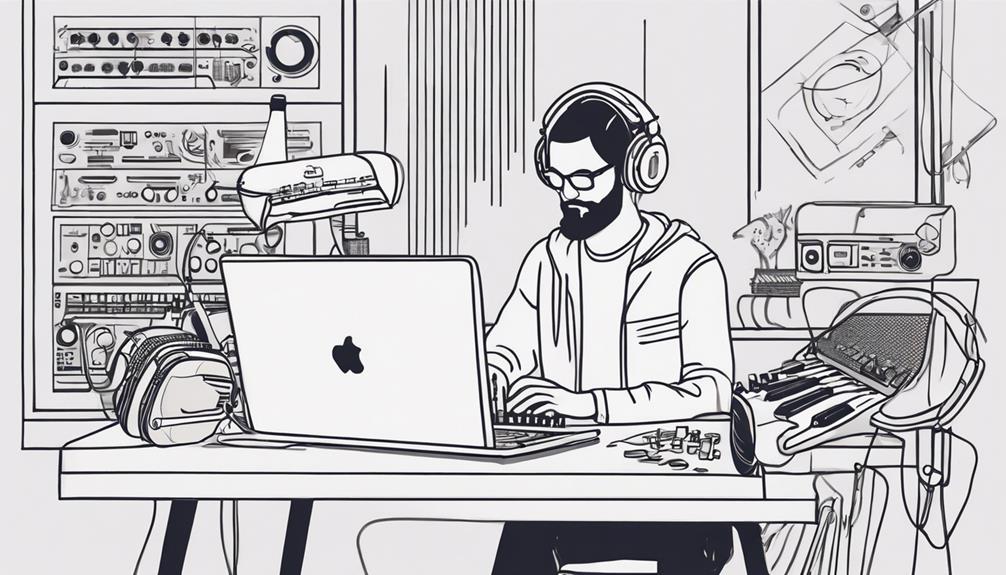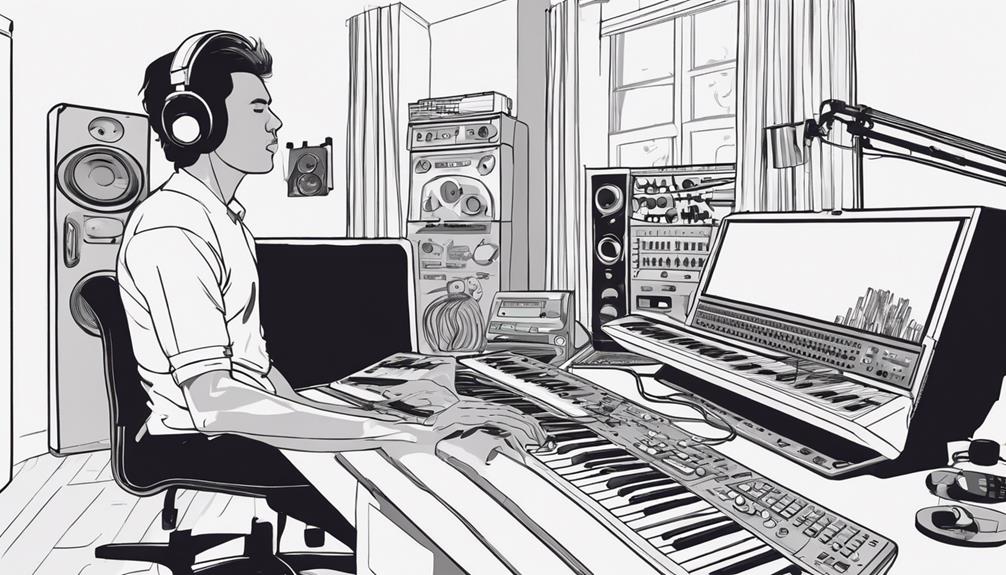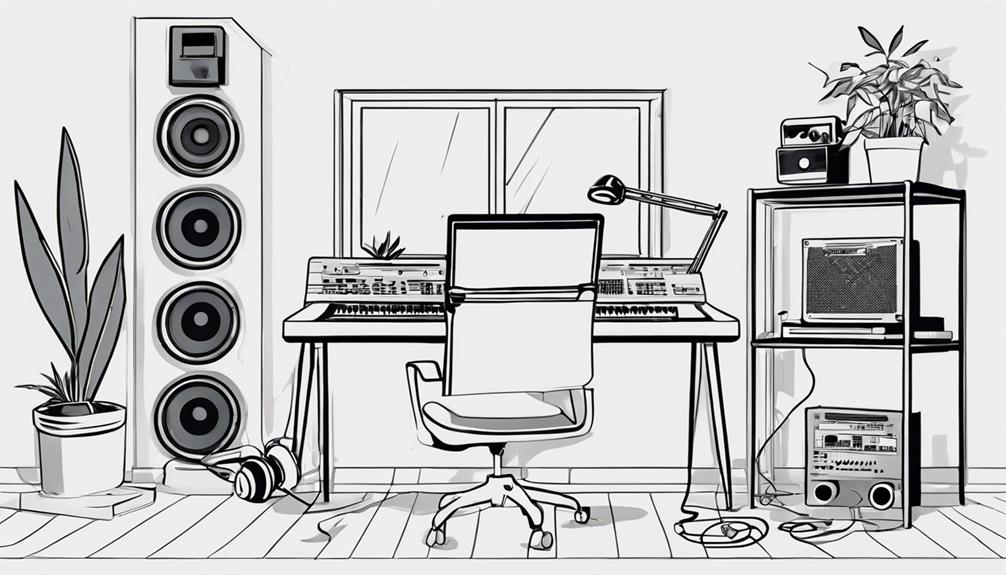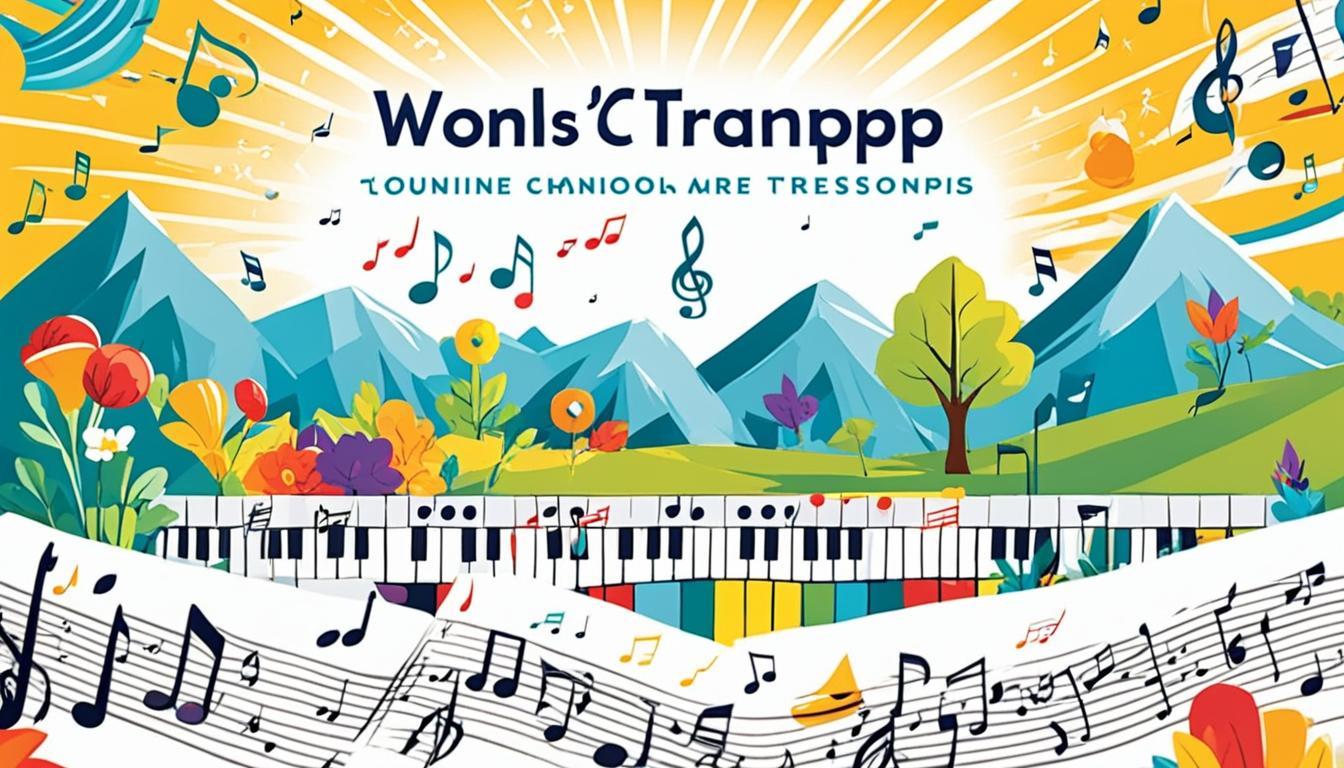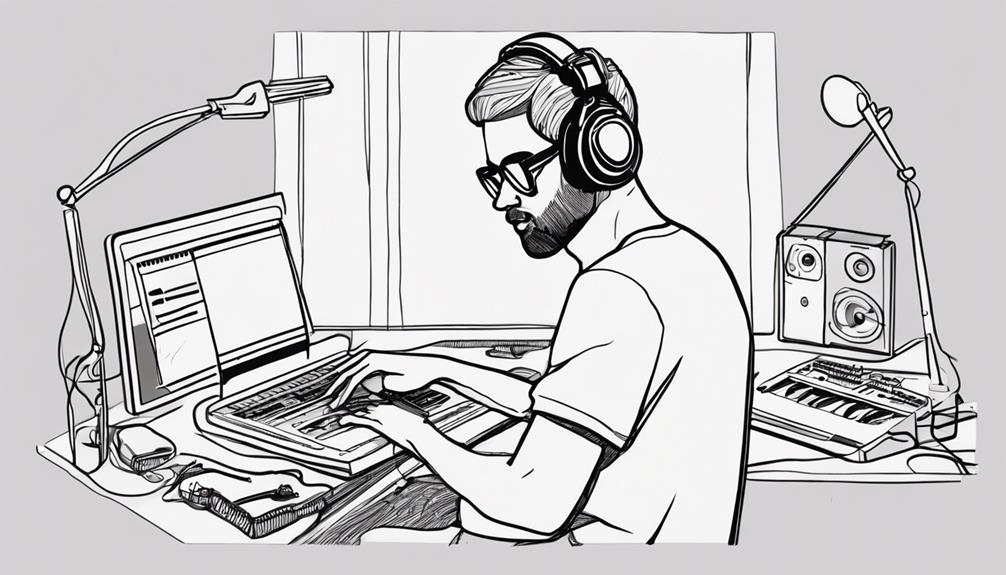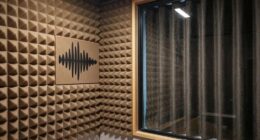To get started in music production as a hobby and indulge in your passion, explore various genres, grasp music theory basics, get comfortable with digital audio workstations, experiment with creating beats, enjoy crafting melodies, collaborate with others, and aim for continuous growth. The world of music production is waiting for you to uncover its endless possibilities, techniques, and creativity! Dive deep into online tutorials, forums, and courses to enjoy music production tips shared by experienced producers and enthusiasts. These resources can inspire new ideas, enhance your skills, and introduce you to innovative techniques. Remember, the journey is just as rewarding as the destination when it comes to creating music that truly resonates.
Key Takeaways
- Explore diverse music genres to expand creativity and production techniques.
- Learn basic music theory concepts for better compositions and arrangements.
- Start with a popular DAW for recording, editing, and producing music.
- Experiment with beat-making techniques and collaborate with others.
- Utilize online resources for growth, stay updated, and seek feedback for improvement.
Explore Different Music Genres
Immerse yourself in exploring various music genres to expand your creative horizon and uncover new sonic possibilities. Cultivating a deep understanding of different music genres not only fuels your passion for music but also equips you with a diverse set of production techniques to experiment with.
Each genre, whether it's electronic, hip-hop, rock, or jazz, offers a unique sonic landscape filled with distinct instruments, rhythms, and production styles waiting to be explored.
Learn Basics of Music Theory
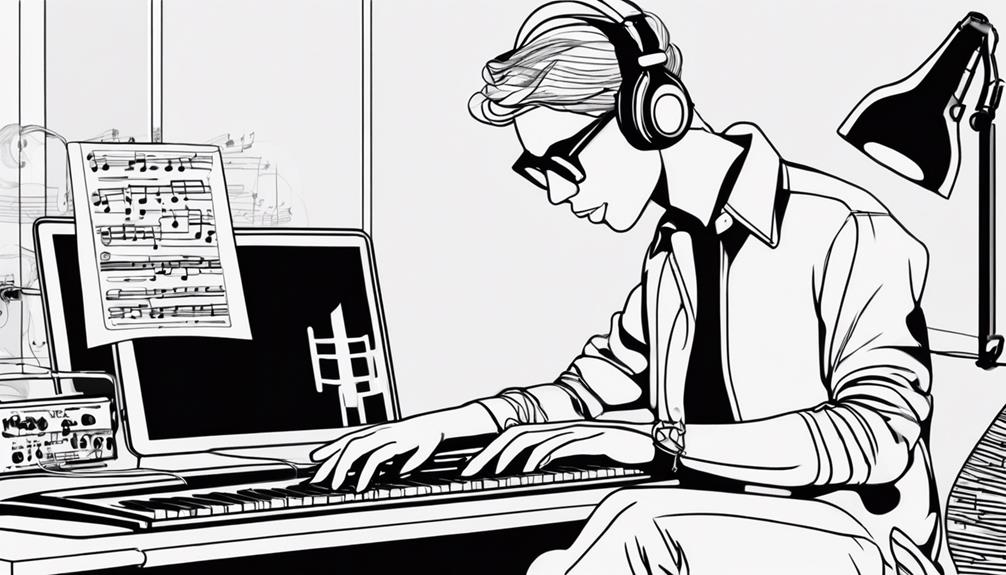
To enhance your music production skills and broaden your creative toolkit, start by learning the basics of music theory. Understanding key concepts such as notes, scales, and chords is essential for creating well-structured and harmonious compositions.
By familiarizing yourself with music theory, you can grasp fundamental elements like time signatures, key signatures, and intervals, which are vital for enhancing your music production abilities.
Delve into online resources, books, and courses that cover music theory to deepen your knowledge in this area. Applying music theory concepts to your production projects will provide hands-on experience and help solidify your understanding.
Mastering the basics of music theory can greatly improve your ability to craft melodies, harmonies, and arrangements that resonate with your audience. So, take the time to learn and practice music theory—it will be a valuable asset in your journey as a music producer.
Familiarize With Digital Audio Workstations (Daws)
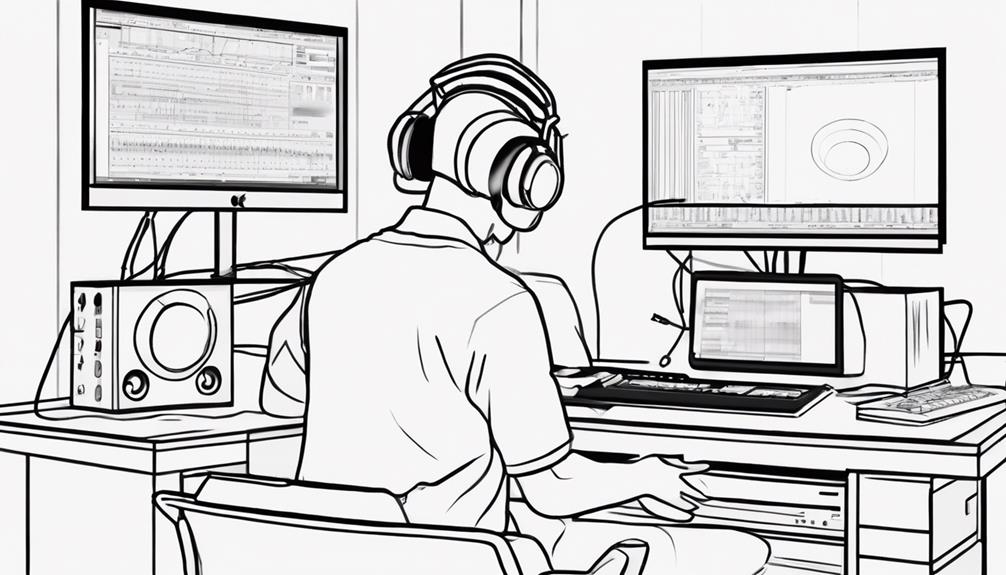
Explore the world of Digital Audio Workstations (DAWs) to kickstart your journey into music production as a hobby. DAWs are software applications essential for recording, editing, and producing music.
Popular options like Ableton Live, FL Studio, Logic Pro, and Pro Tools offer diverse features catering to different preferences. Each DAW boasts a unique interface, workflow, and set of tools, allowing beginners to experiment and find what suits them best.
Understanding how to navigate and utilize these platforms effectively is vital for individuals entering the domain of music production as a hobby. With DAWs, you can arrange music tracks, apply effects, mix sounds, and export your final productions.
Experiment With Beat Creation
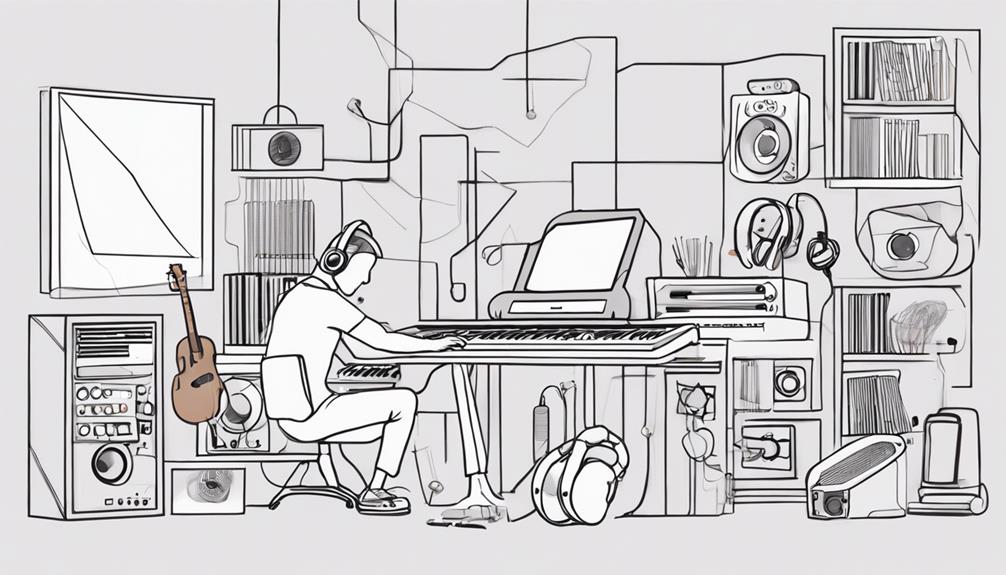
Explore the domain of beat creation to unleash your creativity and cultivate your distinctive sound in music production. Experimenting with different software and hardware options like Ableton Live, FL Studio, or Maschine can help you discover the tools that resonate with your style.
Immerse yourself in beat-making tutorials on platforms such as YouTube or Skillshare to learn various techniques and expand your skill set in music production.
To further enhance your beat-making journey, consider these tips:
- Explore Different Genres: Try your hand at creating beats in various genres like hip-hop, electronic, or pop to uncover where your strengths lie.
- Collaborate with Others: Engaging with other producers or musicians can expose you to new ideas and techniques, pushing your creative boundaries in beat creation.
- Attend Workshops and Seminars: Participating in workshops, seminars, or online courses focused on beat-making can provide valuable insights and help you refine your skills.
Dive Into Melody Making
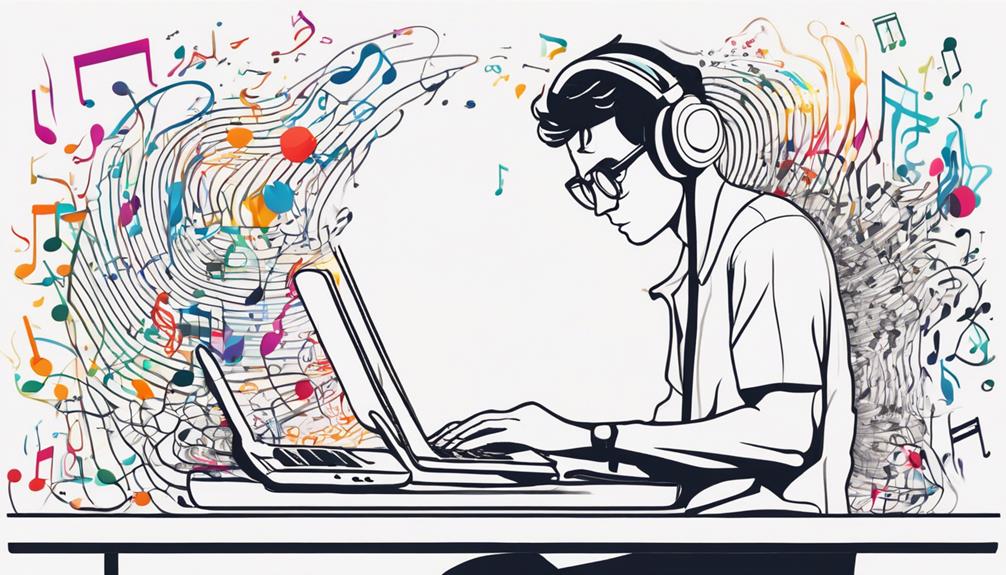
Start creating enchanting melodies by exploring various virtual instruments and MIDI controllers to ignite your creativity and cultivate your distinctive sound in music production.
Immerse yourself in melody making by experimenting with different melodies using virtual instruments and MIDI controllers, allowing you to create unique sounds that reflect your passion for music. To enhance your melody-making skills, delve into basic music theory concepts like scales and chords. Understanding these fundamentals will provide you with a solid foundation to construct mesmerizing melodies that resonate with your audience.
Incorporate loop libraries and sample packs into your creative process to add depth and variety to your melodies. Be open to exploring different genres and styles to find inspiration for crafting diverse and interesting melodies that showcase your musical versatility.
Additionally, collaborating with other musicians or producers can offer valuable insights and techniques for enhancing your melody-making process. Embrace the journey of melody making with enthusiasm and dedication to continually improve and refine your craft.
Arrange Your Music Creations
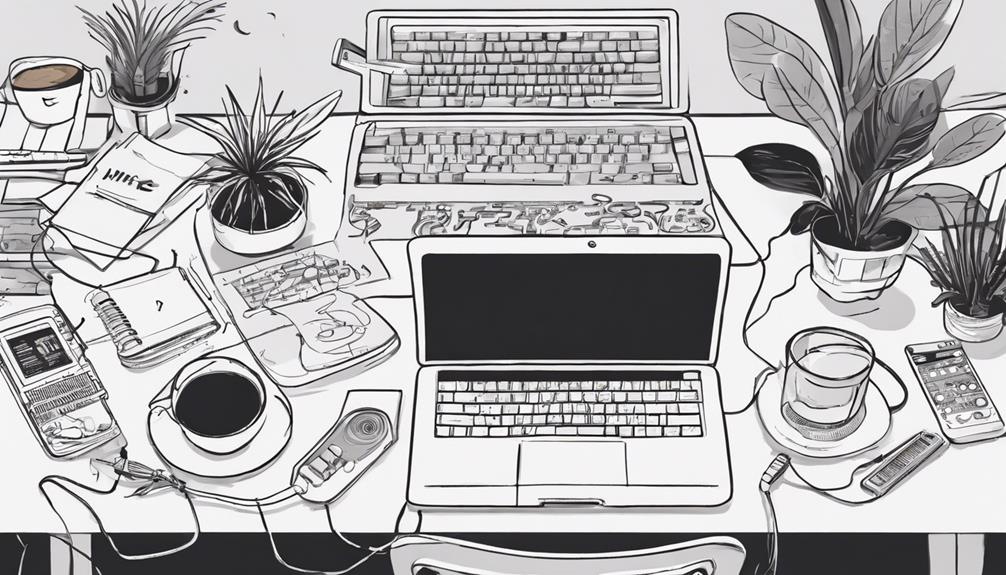
To effectively arrange your music creations, start by organizing your projects, tracks, and samples into separate folders.
Utilize software like Ableton Live or FL Studio to structure and sequence your music ideas efficiently.
Experiment with different arrangements to discover what suits your style and genre best.
Song Structure Tips
Understanding song structure is essential for arranging your music creations effectively. When it comes to crafting your songs, here are some tips to help you make the most out of your song structure:
- Experiment: Don't be afraid to try out different song structures to keep your music fresh and engaging.
- Repetition: Strategic use of repetition can help create a sense of cohesion and familiarity within your music.
- Study Popular Songs: Analyze how successful songs in your genre utilize song structure to captivate listeners.
- Emotional Impact: Consider how the arrangement of your song can evoke specific emotions and enhance the listener's experience.
- Basic Elements: Familiarize yourself with elements like verses, choruses, bridges, and intros/outros to build a strong foundation for your music.
Mixing and Mastering
Begin by blending individual tracks together to create a cohesive sound in your music production process. Mixing is the art of combining different elements such as vocals, instruments, and effects to achieve a balanced and harmonious final product. This step is vital in shaping the overall tone and feel of your music.
Once you have your mix done, it's time for mastering, the final touch that enhances the audio quality and guarantees your music is ready for distribution. During mastering, EQ adjustments, compression, and effects are applied to fine-tune the sound and make it sound polished and professional.
Seek Feedback and Collaborate
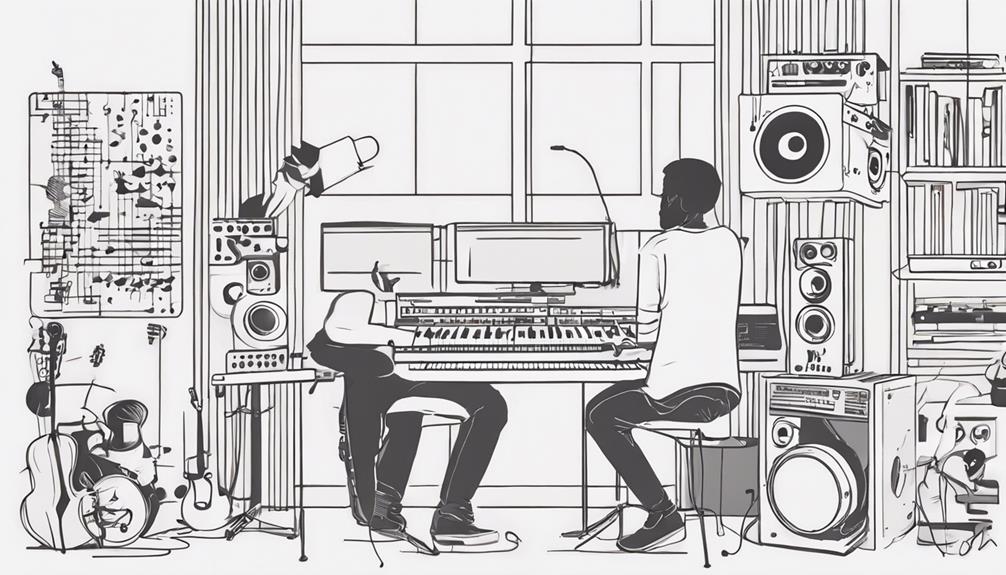
Consider collaborating with other musicians to receive valuable feedback and gain fresh perspectives on your music production projects. Seeking feedback and collaborating with peers in the music production industry can greatly benefit your growth and skills.
Here are some tips to make the most out of feedback and collaboration:
- Exchange Ideas: Share your work with others and be open to their suggestions and opinions.
- Diversify Your Network: Collaborate with musicians from different genres to explore new styles and techniques.
- Attend Workshops or Events: Participate in music production workshops or events to meet like-minded individuals and potential collaborators.
- Utilize Online Platforms: Join online music production communities to connect with a broader range of musicians and producers.
- Give and Receive Constructive Criticism: Provide feedback to others as well, as this can enhance your own critical listening skills and help you grow as a producer.
Engaging in feedback and collaborative projects not only improves your music production but also fosters a sense of community within the industry.
Never Stop Learning and Improving
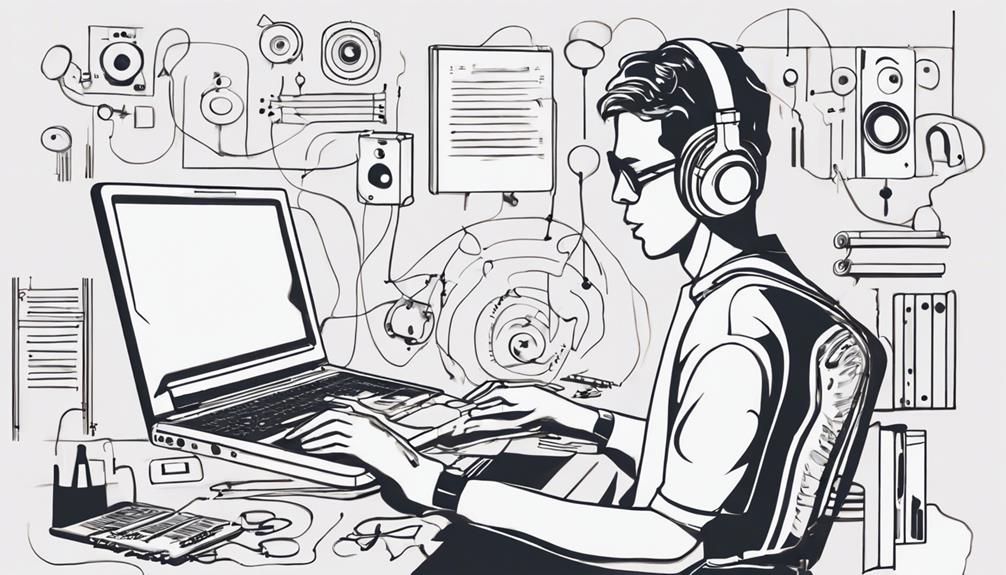
To excel in music production as a hobby, continually dedicate time each week to learning new techniques and refining your skills. Your passion and drive for music production will only grow stronger as you never cease to learn and aim to improve.
Take advantage of online tutorials and courses to expand your knowledge base and stay updated on the latest industry trends. These resources offer valuable insights into advanced production techniques and software functionalities that can enhance your music projects.
Experimenting with different genres, instruments, and production styles won't only keep your creativity flowing but also help you evolve as a versatile producer. Seeking feedback from peers, mentors, or online communities will provide you with constructive criticism and fresh perspectives to further refine your craft.
Additionally, attending music production events, conferences, and networking opportunities will connect you with like-minded individuals, inspiring new ideas and collaborations that can elevate your hobby to the next level.
Frequently Asked Questions
How to Start Music Production as a Hobby?
To start music production as a hobby, invest in basic equipment like a computer and DAW. Learn music theory, sound design, and mixing techniques online. Experiment with creating tracks and collaborate with others. Join communities for feedback and growth.
How to Become a Music Producer With No Experience?
Ready to immerse yourself in music production with no experience? Start by exploring free online resources and tutorials, invest in a beginner-friendly DAW, join online communities for guidance, experiment with genres, practice regularly, and stay open to learning.
Is Music Production a Fun Hobby?
Music production as a hobby offers a world of fun and creativity. You can explore sounds, craft your tunes, and let your imagination soar. Learning new skills in music production is a rewarding journey.
How to Get Into Music as a Hobby?
Interested in exploring music as a hobby? Begin by delving into basic equipment and tutorials. Experiment with creating tracks and remixes. Engage with online communities and attend local events to network and enhance your skills.
Conclusion
Now that you've explored the world of music production, remember to keep enjoying the journey!
Just like a song, your passion for creating music will continue to evolve and grow over time.
Embrace the process, experiment with different sounds, and never be afraid to step out of your comfort zone.
As you continue to learn and improve, your hobby will become a source of endless joy and creativity.
Keep pushing the boundaries and let your passion shine through your music!

